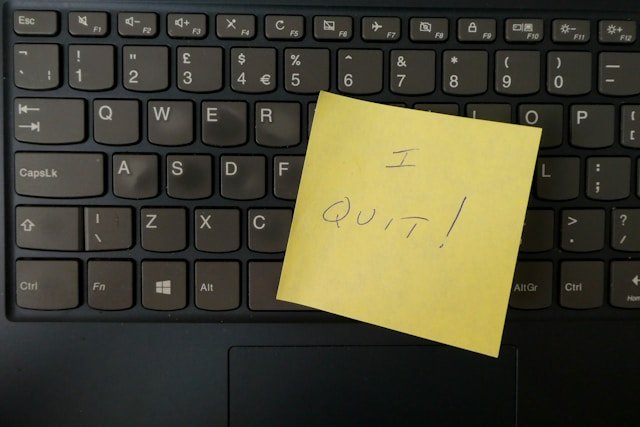Unemployment is at an all-time high, that much is known. But even for those who have jobs, current trends and statistics show that many of them end up quitting their places of employment, some without even planning what to do next or where to go from there. It sounds reckless on the surface, especially in a time when job security is practically a luxury. But if you dig deeper, there’s more to the story than just people giving up on work. So, what exactly is driving this bold wave of job-quitting-without-a-backup-plan?
1. Jobs are no longer Fulfilling, Outright Mentally Exhausting.
One of the biggest reasons people walk away from their jobs with no fallback is the toll on their mental health. Constant pressure, tight deadlines, and toxic work cultures are pushing employees to the edge. For many, staying means sacrificing their sanity. And no paycheck is worth that…not in the long run at least.
Burnout has become a buzzword, but it’s also become a legitimate health crisis. People are no longer willing to compromise their peace of mind just to survive another Monday meeting. They’d rather take a leap into the unknown than stay stuck in an environment that drains them.
2. The Rise of “Soft Quitting” and the Search for Purpose
“Quiet quitting” turned into a trend in 2022, one of those gen-z trends, but now we’re seeing the louder version: actually quitting. Employees are reevaluating their values, and seeking jobs that align with their personal goals, beliefs, or creative passions. Many aren’t just looking for work—they’re looking for meaningful work, which is proving hard to land.
People want flexibility, autonomy, and work that reflects who they are. That could mean switching industries, starting a business, freelancing, or taking a sabbatical. Some don’t even know what’s next—they just know they need to stop what they’re doing now.
3. Toxic Work Environments Are a Bigger Deal Than Most Think
And then the not-so-obvious elephant in the room: toxic workplaces. Micromanagement, lack of support, unrealistic expectations, and discrimination are just a few ingredients in the poison soup.
A toxic job doesn’t just make you hate Mondays—it can affect your health, self-esteem, and relationships. People are realizing that the cost of staying is simply too high. So they leave, with or without a plan. And honestly? Sometimes, leaving is the plan.
You Might also be Interested in 5 Powerful Reasons to Leave a Toxic Environment
4. The Gen-Z Mindset Is Redefining the Workforce
Younger workers are breaking the rules that older generations followed for decades. The “work hard, stay loyal, and retire with a gold watch” mindset doesn’t resonate with Gen Z. This generation prioritizes work-life balance, mental health, and job satisfaction.
They’re more likely to job-hop, switch careers, or take a gap year. They’re also digital natives, meaning side hustles, remote work, and online income streams are completely viable options. To them, quitting isn’t always a crisis—it’s a pivot. Just another tackle to sort out.
5. The Pandemic Shifted Everything
COVID-19 forced the world to pause and reflect. For many, it was a wake-up call: life is fragile, and time is limited. People started questioning whether they were truly happy or just surviving, and that introspection led to what we now call the Great Resignation.
Even years later, the aftershocks continue. Workers are bolder now, and more willing to chase personal fulfillment instead of settling. The pandemic didn’t just change how we work—it changed why we work.
6. The “Better Than Nothing” Mindset Is Fading
There used to be a mindset that a bad job was better than no job. Having something little was better than nothing at all. Well, that mindset is fading fast. Now, many believe that a bad job is worse because it keeps you stuck and eats away at your energy and creativity. So much so that you won’t have the time or energy to look for greener pastures, you will just be in a constant loop of dread where you are, slowly wasting away.
Instead of clinging to toxic or unfulfilling roles, people are choosing to break free. They’re willing to face a few months, even years on end of uncertainty and job hunting if it means they get the chance to find something better. It’s scary, yes. But it’s also empowering…for those with the guts to take it on.
7. Financial and Career Independence Are More Accessible
Thanks to online opportunities and digital platforms, people now have alternative ways to earn income. Freelancing, remote gigs, e-commerce, affiliate marketing, content creation, and even investing are viable paths. For some, a 9-5 is no longer the only or best option, it might be a means to an end as a source of capital to invest elsewhere.
This change gives people the courage to leave jobs that aren’t working, even if they don’t have a backup today, they know there are other ways to survive tomorrow. They’re trading certainty for possibility.
Quitting Without a Plan Isn’t Always Irresponsible
It’s easy to judge someone who walks away from a job without a new one lined up. But the truth is, sometimes the smartest thing you can do for your future is to stop doing what’s hurting you today. Whether it’s burnout, toxicity, or just a gut feeling that you’re meant for something more, quitting can be a form of self-care.
Yes, it’s risky. But so is staying in a job that slowly eats away at your spirit. In a world that’s finally learning to value well-being, authenticity, and purpose, maybe quitting without a backup plan isn’t recklessness after all. Maybe it’s rebellion—and maybe, just maybe, it’s the beginning of something better.
Indeed shares 20 Reasons to Quit a Job Without Another Lined Up




